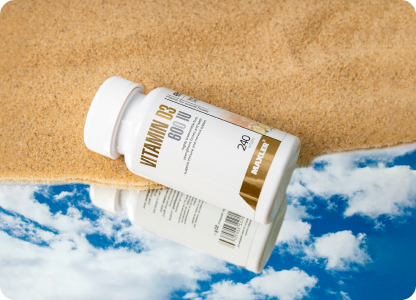vitamin D and bone health

There’s one vitamin that springs to mind when we see the sunshine. That is vitamin D, an important micronutrient that helps our body run at its best. You’re likely familiar with its role in maintaining strong bones, but there’s more to this vitamin than just that. In fact, it interacts with a wide variety of processes in our body, and so it’s implicated in a multitude of conditions.
What does vitamin D do?
It is a fat-soluble vitamin which exists as vitamin D2. We get it from food. Vitamin D3 can be made by our body when exposed to UVB light. It is needed by all cells in our body, including white blood ones.
Vitamin D plays a crucial role in maintaining bone health, but it can be beneficial in other processes, like hair loss1. Also, it may help prevent various diseases, and help improve their symptoms.
Why is Vitamin D essential for our bones and muscles?
A deficiency in vitamin D causes poor absorption of calcium, which results in low bone density, making them weak. This can make people more susceptible to fractures. Trials using supplements of 700-800 IU per day found that vitamin D can decrease the risk of having a hip fracture by 26%2.
Deficiency can also cause non-specific muscle weakness and aches.

Chronic conditions - do they have anything to do with vitamin D?
Vitamin D is implicated in hypertension, cardiovascular disease, and diabetes. Evidence suggests that vitamin D may be important in helping to regulate blood pressure - people who get more vitamin D are likely to have a lower blood pressure and are less likely to suffer from a cardiovascular event, such as heart attacks and arrhythmia3.
Not getting enough vitamin D can also make it harder to make and sense insulin, making it hard to tolerate glucose. A study of over 80,000 women proposed that getting plenty of vitamin D can decrease the risk of diabetes by 33%4.
Vitamin D - key for the immune system
Taking additional vitamin D has shown to decrease the number of respiratory tract infections a person gets, potentially helping to decrease the chances of getting the flu5. It may also decrease the risk of asthma worsening6.
Vitamin D and mental health
There is some evidence that getting a lot of vitamin D can improve depressive symptoms when taken for one year. Getting less vitamin D may be associated with anxiety7. It is also very important for the mental health of pregnant women, as deficiency may be associated with postpartum depression, poor sleep quality and anxiety8.
Are you deficient in vitamin D?
The daily amount of vitamin D that is recommended for those that are over 18 is 15 micrograms or 600 IU9.
As vitamin D is essential, it is key to look out for deficiency symptoms. They can be hard to notice, and the best way to check whether you have a deficiency is to get a blood test. However, here are some signs you may want to look out for10:
- Frequent sickness;
- Fatigue;
- Pain in the bones, muscles or back;
- Bone and hair loss;
- Weight gain.
If you are older, have dark skin, don’t eat fish or dairy, don't go outside a lot, or have a chronic condition like kidney disease or Crohn's, you may be more at risk of a vitamin D deficiency. Also, wearing sunscreen with SPF 30 decreases our body's ability to create vitamin D up to 95%11,12.
Foods containing lots of vitamin D
To make sure you're making enough vitamin D, ensure to get enough sunlight, especially UVB rays. You can also eat more foods which contain vitamin D. These include13:


- Fatty fish;
- Mushrooms grown under UV light;
- Milk with added vitamin D;
- Eggs;
- Beef liver;
- Cheese;
- Cereals with added vitamin D;
- Tofu with added vitamin D.
If you're vegetarian or vegan, it may be better to look at vitamin D supplements to meet your daily recommended amounts.
Vitamin D - the best supplements
If you’re looking to up your vitamin D intake, look no further than Maxler vitamin D supplements.
Maxler Vitamin D3 5000 IU Drops is an orange-tasting supplement that contains a high dosage of vitamin D. These drops are easy to incorporate into a busy lifestyle, to ensure that you’re getting enough of this essential nutrient no matter what’s going on in life.
Maxler Vitamin D3 1200 IU tabs come in a pack of 180 and 360 tabs, containing 30 mcg of vitamin D as well as 100 mg of calcium in each tablet, to ensure that you’re not only getting benefits from vitamin D, but also staying on top of your calcium intake.







